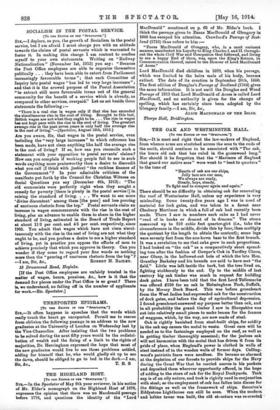SOCIALISM IN THE POSTAL SERVICE. [To rag Boma or rex
nSPECT.LT011."]
SIP"—I deplore, as you, the growth of Socialism in the postal service, but I am afraid I must charge you with an attitude towards the claims of postal servants which is warranted to foster it. In making this charge I am content to confine myself to your own statements. Writing on "Railway Nationalization" (November 1st, 1913) you say: "Because the Post Office employees are able to organize themselves politically . . . they have been able to extort from Parliament increasingly favourable terms "; that each Committee of Inquiry into postal wages "has led to very large increases"; and that it is the avowed purpose of the Postal Association "to extract still more favourable terms out of the general community for the benefit of a service which is already, as compared to other services, overpaid." Let us set beside these statements the following :— "There is a real rise in wages only if that rise has exceeded the simultaneous rise in the cost of living. Brought to this test, British wages are not what they ought to be.... The rise in wages has not kept pace with the rise in the cost of living. The greatest average rise in the past seven years is only half the average rise in the cost of living."—(Spectator, August 16th, 1911) Are you aware, Sir, that wages in the postal service, even including the " very large increases" to which reference has been made, have not risen anything like half the average rise in the cost of living P If so, how can you reconcile such a statement with your opposition to postal servants' claims ? How can you complain if working people fail to see in such words anything more praiseworthy than a desire to discredit what you call (I think with justice) " the reckless finance of the Government "P In your admirable criticism of the manifesto put forth by the Council for Christian Witness on Social Questions yen say (December 6th, 1913): "The old economists were perfectly right when they sought a remedy for poverty [there is plenty in the postal service!] in raising the standard of living. . . . We want to see more ' divine discontent' among them [the poor] and lees pouring of unctuous rhetoric from the top." Postal servants claim an increase in wages commensurate with the rise in the cost of living, plus an advance to enable them to share in the higher standard of living, estimated in the Board of Trade Report at about 11.3 per cent. and 4.5 per cent. respectively, since 1905. You admit that wages which have not risen gime], taneonsly with the rise in the cost of living are not what they ought to be, and you profess a desire to see a higher standard of living, yet in practice you oppose the efforts of men to achieve precisely that which you approve in theory. Can you wonder if they come to regard your fine words as nothing more than the "pouring cf unctuous rhetoric from the top "P
—I am, Sir, dm., HOBERT H. BAILEY.
12 Drummond Road, Hoylake.
[If the Post Office employees are unfairly treated in the matter of wages, hours, pensions, &c., how ie it that the demand for places under the Post Office is so great P There is, we understand, no falling off in the number of applicants for work.—En. Spectator.]










































 Previous page
Previous page